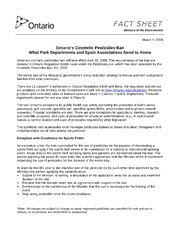
Fact sheet, Ontario's cosmetic pesticides ban : what park departments and sport associations need to know PDF
Preview Fact sheet, Ontario's cosmetic pesticides ban : what park departments and sport associations need to know
FACT SHEET Ministry of the Environment March 4, 2009 Ontario’s Cosmetic Pesticides Ban What Park Departments and Sport Associations Need to Know Ontario’s cosmetic pesticides ban will take effect April 22, 2009. The requirements of the ban are detailed in Ontario Regulation 63/09 made under the Pesticides Act, which has been amended by the Cosmetic Pesticides Ban Act, 2008. The ban is part of the McGuinty government’s toxics reduction strategy to reduce pollution and protect families from toxic chemicals. There are 11 classes* of pesticides in Ontario Regulation 63/09 and these, the regulation and the act are available on the Ministry of the Environment’s web site at www.Ontario.ca/pesticideban. Pesticide products with controlled sales or banned sales are listed in Classes 7 and 8, respectively. Pesticide ingredients banned for use are listed in Class 9. The ban contains exceptions for public health and safety (including the protection of public works structures), golf courses, specialty turf, specified sports fields, arboriculture and to protect natural resources, if certain conditions are met. There are also exceptions for agriculture, forestry, research and scientific purposes, and uses of pesticides for structural exterminations (e.g., in and around homes to control insects) and uses of pesticides required by other legislation. The provincial ban supersedes local municipal pesticides bylaws to create one clear, transparent and understandable set of rules across the province. Exception with Conditions for Sports Fields An exception under the ban is provided for the use of pesticides for the purpose of maintaining a sports field, but only if the sports field needs to be maintained for a national or international sporting event. Areas around the sports field including lawns and gardens are not exempt under the ban. The person applying the pesticide must enter into a written agreement with the Minister of the Environment respecting the use of pesticides for the duration of the event only. At least six months prior to the intended use of the pesticide (or by such other time approved by the Minister) the person applying the pesticide must: $ Submit to the Minister, in writing, a description of the application area, the purpose and expected duration of the use $ Request that the Minister enter into an agreement with respect to the use $ Demonstrate to the satisfaction of the Minister that the use is necessary for the hosting of the event $ Stop using pesticides once the event concludes. *Note: All classes are subject to change as newly registered pesticides are classified for sale and use in Ontario, or as products are reclassified or declassified. Compliance and Enforcement The ministry manages its approach to compliance and enforcement through education and outreach, inspections, response to incidents, voluntary abatement, orders, tickets and prosecutions. In the case of the pesticides ban, the ministry will focus its initial efforts on education when responding to reports of suspected non-compliance. Questions or non-compliance reports should be directed to a ministry district office during regular business hours (look in the Blue Pages in your telephone directory or see a listing on the ministry’s web site at www.ene.gov.on.ca/en/about/org/index.php#4). After business hours call the ministry’s Pollution Hotline at 1-866-MOE-TIPS (1-866-663-8477). For more information: Questions about the ban can be directed to the Ministry of the Environment’s Public Information Centre at 1-800-565-4923 or 416-325-4000. Several fact sheets are available on the ministry’s website for specific audiences, as well as a general fact sheet about the regulation and suggestions on caring for lawns and gardens with greener alternatives. 2
